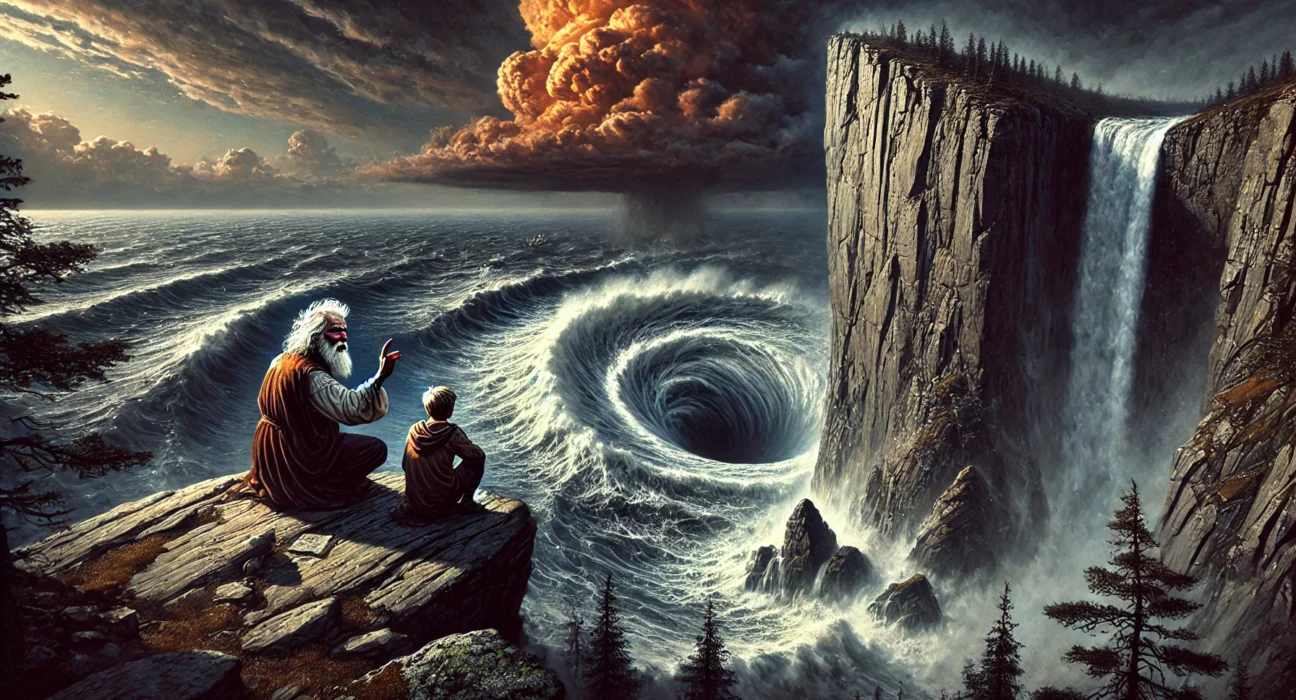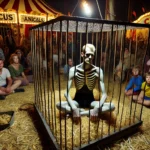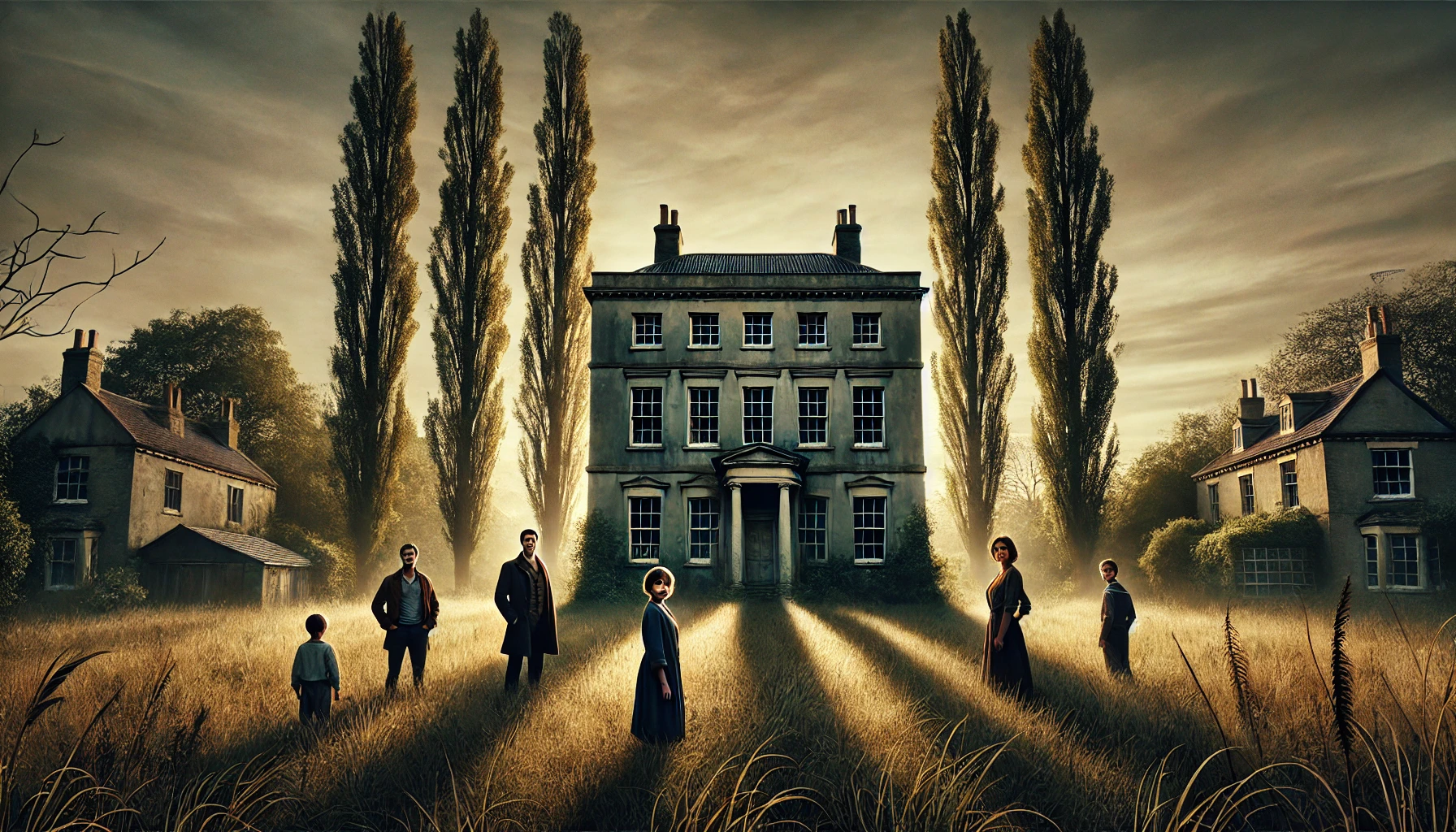“A Descent into the Maelström” is a short story by Edgar Allan Poe, first published in 1841. This harrowing tale of survival and natural terror exemplifies Poe’s fascination with the sublime and the mysterious forces of nature. Set against the desolate backdrop of the Norwegian coast, it chronicles a fisherman’s terrifying experience with the infamous whirlpool known as the Maelström. The story reflects Poe’s mastery in blending psychological tension with the overwhelming power of nature, making it a prime example of Romantic and Gothic literature.
Plot Summary
On the rugged coast of Norway, an aged fisherman leads a traveler to the top of a towering crag, overlooking the stormy waters of the Lofoden Islands. The air is tense, filled with the howling wind and the echo of crashing waves below. The fisherman, though seemingly frail and broken, begins to tell the traveler a tale that forever altered his life—a story of terror, survival, and the relentless power of the sea.
Years ago, the fisherman and his two brothers set out on a fishing expedition near the island of Moskoe, venturing close to a notorious whirlpool known as the Maelström. It was a day unlike any other, with a calm and steady breeze, and their boat quickly filled with a bounty of fish. Satisfied with their catch, they began the journey home, timing their return to pass through the treacherous waters during the slack tide, when the whirlpool’s power would temporarily wane.
As they sailed across the sea, an eerie change swept over the weather. The once gentle breeze shifted suddenly, coming from the direction of Helseggen, a dark and brooding mountain. Without warning, the skies darkened, and a strange, copper-colored cloud appeared on the horizon. A violent storm was upon them. The wind roared with unnatural force, and within moments, their boat was tossed about by furious waves. The masts snapped like twigs, and one of the fisherman’s brothers, lashed to the mainmast, was swept away into the sea.
The storm drove their boat toward the dreaded Maelström. The fisherman and his remaining brother, powerless to steer, realized they were being drawn toward the heart of the whirlpool, its monstrous vortex growing louder and more violent with each passing second. They were doomed. As the boat approached the whirlpool, the sea began to rise in towering waves, and soon the vessel was spinning in the outer fringes of the Maelström’s swirling waters.
At the edge of the whirlpool, where the ocean seemed to fall away into an abyss, the world around them transformed into a surreal nightmare. The sky parted in a circle above, revealing a full moon shining down with cold brilliance. Its light illuminated the terrifying spectacle below—a vast, black funnel of water, spinning with a terrible and unstoppable force. The fisherman’s brother, overcome by madness and fear, tried to wrest control of the boat, but the old man, realizing the futility of resistance, clung to a barrel, his mind racing with desperate thoughts.
As they plunged into the vortex, the fisherman’s terror gave way to a strange calm. A sense of awe overwhelmed him as he witnessed the raw, sublime power of nature. Amid the chaos, he noticed the behavior of objects caught in the whirlpool. Some, like fragments of ships and barrels, descended more slowly than others. He observed that cylindrical objects seemed to resist the pull of the Maelström better than other shapes. This realization ignited a faint glimmer of hope.
Determined to survive, he lashed himself to one of the barrels and prepared to throw himself into the sea. His brother, now beyond reason, refused to abandon the boat and clung desperately to the ring-bolt for support. In a moment of agonizing sorrow, the fisherman left his brother behind, knowing there was no saving him from the inevitable.
He leaped into the dark, churning water, clinging to the barrel as the whirlpool continued its violent rotations. Time lost meaning as he spun round and round, carried deeper into the funnel. He braced himself for death, but instead, he found that the barrel slowed his descent, keeping him afloat in the maelstrom’s deadly grip. While the boat and his brother were swallowed by the abyss, the fisherman began to notice the whirlpool weakening.
Slowly, the ferocious pull of the Maelström eased, and the waters began to calm. The monstrous vortex that had once threatened to drag him to the ocean’s depths diminished, and the sea, though still turbulent from the aftermath of the storm, released him from its grasp. As the waves subsided, the fisherman floated on the surface, exhausted but alive. The moon, now low on the horizon, cast a soft glow over the quieting waters.
Hours later, he was found by a fishing boat, his hair turned white from the terror he had endured. His companions scarcely recognized him, so profound was the transformation wrought by his ordeal. Though they listened to his story, they could not comprehend the full horror of what he had witnessed. His survival seemed as miraculous as the Maelström itself, a testament to the small but potent power of human ingenuity and observation in the face of nature’s overwhelming might.
The old fisherman, now a shadow of his former self, concludes his tale as the traveler listens in silence. The landscape before them—cold, desolate, and indifferent—mirrors the haunting memory of the great whirlpool that had once claimed so much and spared so little. And though the fisherman’s words echo with the weight of truth, the traveler can hardly believe that a man could emerge from the Maelström alive, changed forever by his descent into its depths.
Main Characters
The Old Man (Narrator): The protagonist, a weathered fisherman who recounts his near-death experience. His ordeal transforms him both physically and mentally, turning his hair white from terror and altering his outlook on life. His resilience and ability to observe calmly in the face of death define his character.
The Narrator’s Brothers: Though less central, the narrator’s brothers are integral to his tale. They accompany him on the fateful fishing trip and meet tragic ends. Their deaths illustrate the indiscriminate cruelty of nature.
Theme
The Power of Nature: The Maelström symbolizes the immense, uncontrollable forces of nature. The story conveys humanity’s insignificance against these forces, as the fisherman and his brothers are powerless against the storm and whirlpool. The Maelström’s ferocity highlights how small and fragile humans are in the grander scheme of the natural world.
Terror and Survival: The story revolves around the narrator’s experience of primal fear and his instinct for survival. His shift from despair to a calculated calm in the midst of chaos is a testament to human resilience. The Maelström becomes not just a physical, but a psychological trial.
Knowledge as Power: Observing the different objects within the whirlpool, the narrator deduces that certain shapes resist the vortex better than others. This newfound knowledge allows him to survive. This theme reinforces the idea that rational thought and observation can sometimes conquer fear and seemingly insurmountable odds.
Mortality: The proximity of death and the contemplation of one’s own mortality are core elements of the story. The protagonist reflects on the beauty and terror of dying in such an overwhelming natural setting, showcasing Poe’s fascination with death.
Writing Style and Tone
Poe’s “A Descent into the Maelström” is a quintessential example of his Gothic style, infused with Romantic elements. The tone shifts from awe to terror, then to a contemplative acceptance of fate. Poe uses detailed, vivid descriptions to immerse the reader in the natural setting, building an atmosphere that is at once sublime and terrifying. The whirlpool, described in almost mythic terms, becomes a living, breathing entity that dwarfs human comprehension.
The story’s pacing reflects the increasing intensity of the storm and the whirlpool, with the action spiraling into chaos just as the characters do. Poe’s use of first-person narration allows readers to experience the narrator’s terror firsthand, and his meticulous attention to scientific details adds a layer of realism to the otherwise supernatural atmosphere. This juxtaposition of the rational and the fantastic is characteristic of Poe’s ability to evoke both psychological depth and visceral fear.
We hope this summary has sparked your interest and would appreciate you following Celsius 233 on social media:
There’s a treasure trove of other fascinating book summaries waiting for you. Check out our collection of stories that inspire, thrill, and provoke thought, just like this one by checking out the Book Shelf or the Library
Remember, while our summaries capture the essence, they can never replace the full experience of reading the book. If this summary intrigued you, consider diving into the complete story – buy the book and immerse yourself in the author’s original work.
If you want to request a book summary, click here.
When Saurabh is not working/watching football/reading books/traveling, you can reach him via Twitter/X, LinkedIn, or Threads
Restart reading!








